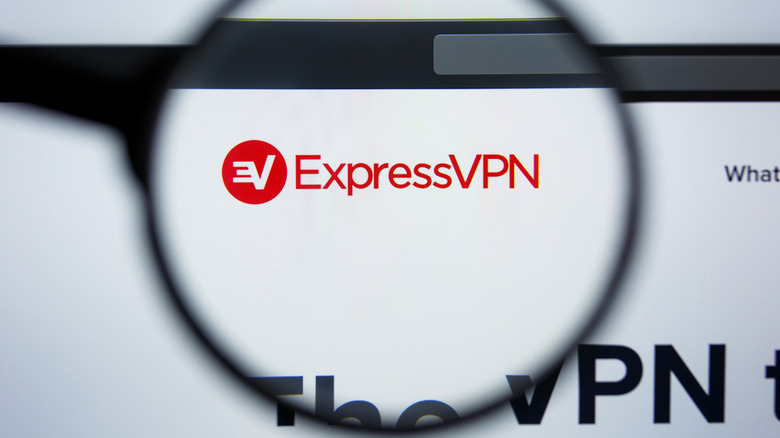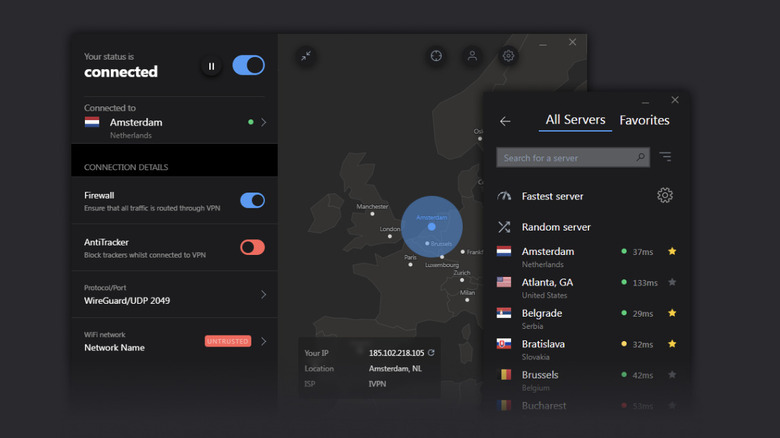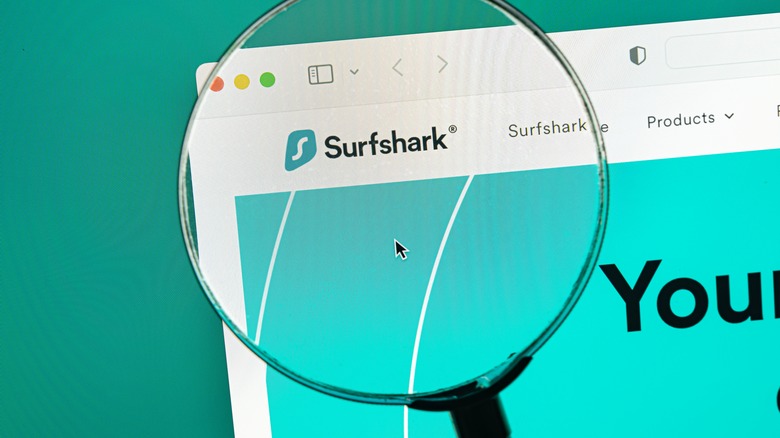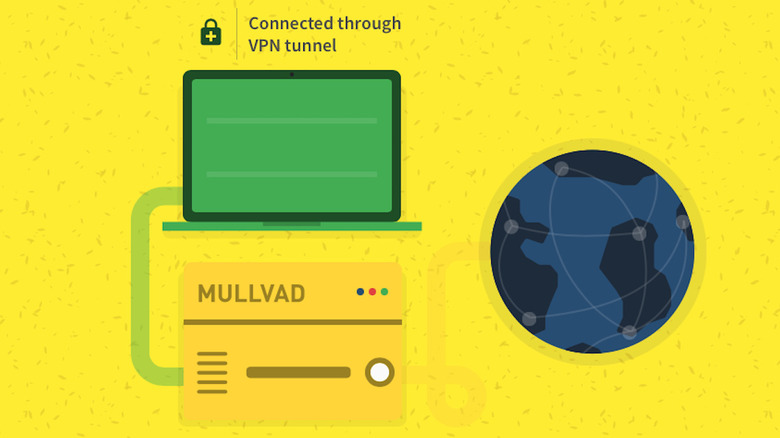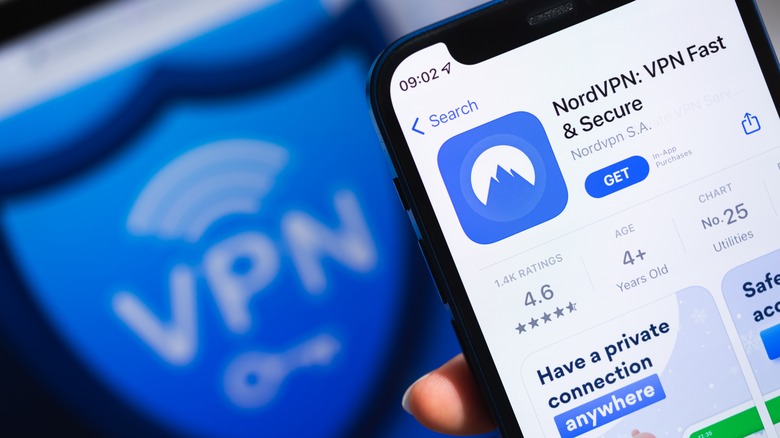5 Of The Top VPNs To Use In 2024
If you're not already using a VPN (virtual private network), you may want to start. By establishing a digital connection between your computer and one of its remote servers, a VPN lets you use the internet without your ISP tracking your data, which can include your personal information, web history, and IP address. Plus, VPNs can often get you around firewalls and website blocks, which can be as important as sidestepping political censorship or as mundane as streaming content from your home country while traveling abroad. In fact, there are many reasons why you may want to use a VPN with streaming devices or use it for any number of other applications.
Not all VPNs are built the same, however. They can vary greatly in the number of servers they offer, the locations they can be found, the jurisdictions they are legally bound to, and other important policies and features regarding your privacy and security. They can also vary greatly in cost, and while going with a free VPN might be tempting if you're budget-conscious, you should be wary of any free VPN services. To make sure you're not wasting money on a VPN that isn't worth it, here's a breakdown of some of the best VPNs available. Based on hands-on testing and analysis from several reputable publications (more on that at the end of the article), here are five of the top VPNs to use this year.
ExpressVPN
ExpressVPN is commonly used by many tech and cybersecurity experts, which is always a good sign. It's clear why it's one of the more popular VPNs — with a vast network of over 3,000 RAM-only servers established across 160 locations in 105 countries, ExpressVPN lives up to its name by providing fast VPN access with unlimited bandwidth. After testing several different options, CNET said the service "is one of the fastest VPNs we've tested, registering an 18% speed loss in our latest tests" conducted last year. That makes it particularly great for streaming and gaming. It's also simple to use — its landing screen presents a clear, single button that will quickly connect you, as well as a drop-down menu where you can easily select a server location, with the fastest nearby city selected as a default.
With its jurisdiction in the British Virgin Islands, ExpressVPN is also one of the more transparent VPNs on the market. It has published details about its TrustedServer deployment process, released its open-source Lightway encryption protocol, and increased its amount of independent third-party audits, among other efforts. It also has a strong focus on security, offering several security and privacy tools, as well as other settings and options in a single, easy-to-access menu. Features include a kill switch, an on-board IP address checker, a password generator, and two leak testers. When CNET tested ExpressVPN, they detected no leaks.
ExpressVPN only offers eight simultaneous connections, whereas some of its rivals offer an unlimited number. However, depending on your needs, eight should be enough for a small household. It's also one of the pricier VPNs on the market, costing $100 for a year-long subscription, $60 for six months, and $13 per month if you want to pay as you go.
IVPN
IVPN might be less known than some other major VPNs, but that doesn't mean it isn't one of the best available. After weeding out dozens of VPN services, Consumer Reports tested 16 of the best, and of those 16, only three companies offered VPNs that met five very important criteria. One of those three was IVPN, which prioritized the five things Consumer Reports says you should look for from a virtual private network provider: overall privacy, overall security, accurate representation, open source software, and recent public audits.
The company uses a legal department and a centralized process to receive, evaluate, and respond to information requests from government and law enforcement agencies. It will deny requests it finds to be inappropriate or have no valid legal basis. Because it's open source, you can trust that IVPN's code is doing what it claims to do, which includes using a checksum to confirm no errors are embedded in the software you download. Plus, it's compatible with Android, iOS, macOS, Windows, and Linux.
IVPN also puts its ethics front and center, following a "privacy-first mindset" that doesn't use private information, trackers, or third-party tools. IVPN is registered in Gibraltar and has servers in over three dozen countries, which is far less than some of its bigger competitors but should provide you with a decent number of options. IVPN offers subscriptions by the week, month, year, and two or three-year increments, which become more cost-effective with each tier. Its standard tier starts at $60 per year and allows for two simultaneous devices, while its pro tier starts at $100 per year, allows for seven simultaneous connections, and includes multi-hop routing. You can register anonymously with no email and pay in cash, Monero, or Bitcoin if you'd like.
SurfShark
If you're looking for a VPN that allows for unlimited connections to your devices, Surfshark is a solid choice. Based in the Netherlands, the VPN offers access to 3,200 RAM-only servers across 100 different countries. It's also flexible — compatible with Windows, MacOS, iOS, Android, Linux, Android TV, Fire TV, and Firefox. ZDNet, which tested the service and found no data leaks, praises Surfshark for its "wide range of useful features," which includes anti-tracking, multihop routing, and a data breach scanner, as well as a kill switch — which is ideal with any VPN. The only data Surfshark logs are billing information, and the secure VPN uses AES-256-GCM, Perfect Forward Secrecy, and RSA-2048 encryption. Plus, the company provides a live warrant canary that reports any government requests (as of January 8, 2024, it has currently received zero government warrants, gag orders, or National Security letters.)
One of SurfShark's biggest assets is its affordability, and you can access it for as little as $2 per month. The service has three tiers, and you can pay by the month, by the year, or every two years. Its premium tier — Surfshark One+ — costs $3.99 per month with the two-year subscription, but unfortunately, that cost skyrockets to $24.99 if you prefer to pay month-to-month.
Mullvad
After testing dozens of different VPNs, Wirecutter named Mullvad its best VPN of the year, highlighting its transparency, privacy, and security. The company underwent a relatively recent, publicly available third-party security audit of its servers. It also allows you to pay for its services in cash or with other anonymous ways like Bitcoin, Monero, and Bitcoin Cash, as well as through more traditional methods like PayPal and in-app purchases through the iOS store. The company is based in Sweden and says if the government ever finds a legal way to force them to spy on its users, it will shut down its services in that jurisdiction.
Mullvad is also fairly fast, thanks in part to its WireGuard protocol, so it won't get in the way of streaming or torrenting (although it may block certain services, like Netflix). Plus, it's easy to set up and use thanks to a clean and intuitive UI that even beginners can navigate. The service, which can be used on five devices simultaneously, offers 900 servers across 39 countries, multihop and split tunneling features, and a kill switch.
While Mullvad isn't the most affordable VPN, it makes its pricing clear by offering one flat monthly rate (roughly $5.48) — whether you're paying for a month, a year, or a decade. It would be nice to get a discount for a longer commitment, but it's a good deal if you prefer to pay as you go — especially if you're just trying out the service. However, unlike other popular VPNs, Mullvad doesn't have a free trial, so you'll have to spend at least some money to test its network. It does provide a money-back guarantee, though.
NordVPN
If you're looking for speed and consistency in your VPN, you may want to opt for one of the more well-known names in the industry — NordVPN. When thoroughly testing the service last year, CNET found that it lost only 10% of its base internet speed through NordVPN, which has a whopping 5,000 servers across 50 different countries and is one of the fastest VPNs available.
NordVPN works with Windows, MacOS, iOS, Android, Chrome, Linux, Android TV, and Firefox. The company is in the jurisdiction of Panama and doesn't log any personal information besides billing data. Features include a kill switch, data breach scanner, file encryption, the ability to VPN into Tor, a dedicated IP option, and more. One drawback that may have you going with a different VPN is its lack of transparency reports and its limits on torrenting in some countries.
It also only allows for five simultaneous devices, unlike VPNs that offer unlimited connections like Surfshark and Private Internet Access. NordVPN offers three tiers — that can be paid monthly, yearly, or biannually — and can cost as little as $2.99 per month, depending on what you go with. Various payment methods are accepted, including cash and crypto, though not PayPal.
How we selected these VPNs
There are many, many VPNs on the market, and one does not equal the other. In order to compile a list of the top VPNs to use this year, information and reviews were sourced from numerous reputable publications that performed hands-on testing with the VPNs themselves. This hands-on testing allowed the expert reviewers to understand how fast and consistent the VPNs are, what services they work best for, and what additional useful features are included. The sources who tested these VPNs and found them to measure well against others include CNET, Consumer Reports, ZDNet, and The New York Times Wirecutter.
Besides speed and consistency, security and privacy have also been taken highly into consideration — given the very nature of how VPNs work and why you'd want to use one. Factors considered when recommending VPNs include what jurisdiction the company is based in, how transparent the company and its code are, whether it includes important safety features like a kill switch or not, its policies and history with government warrants and requests for personal data and whether it performs independent, third-party audits on itself. Other factors include whether the company allows you to sign up and pay anonymously and if the VPN keeps any records of your web history. After all, a virtual private network wouldn't be worth much if it wasn't very private.

